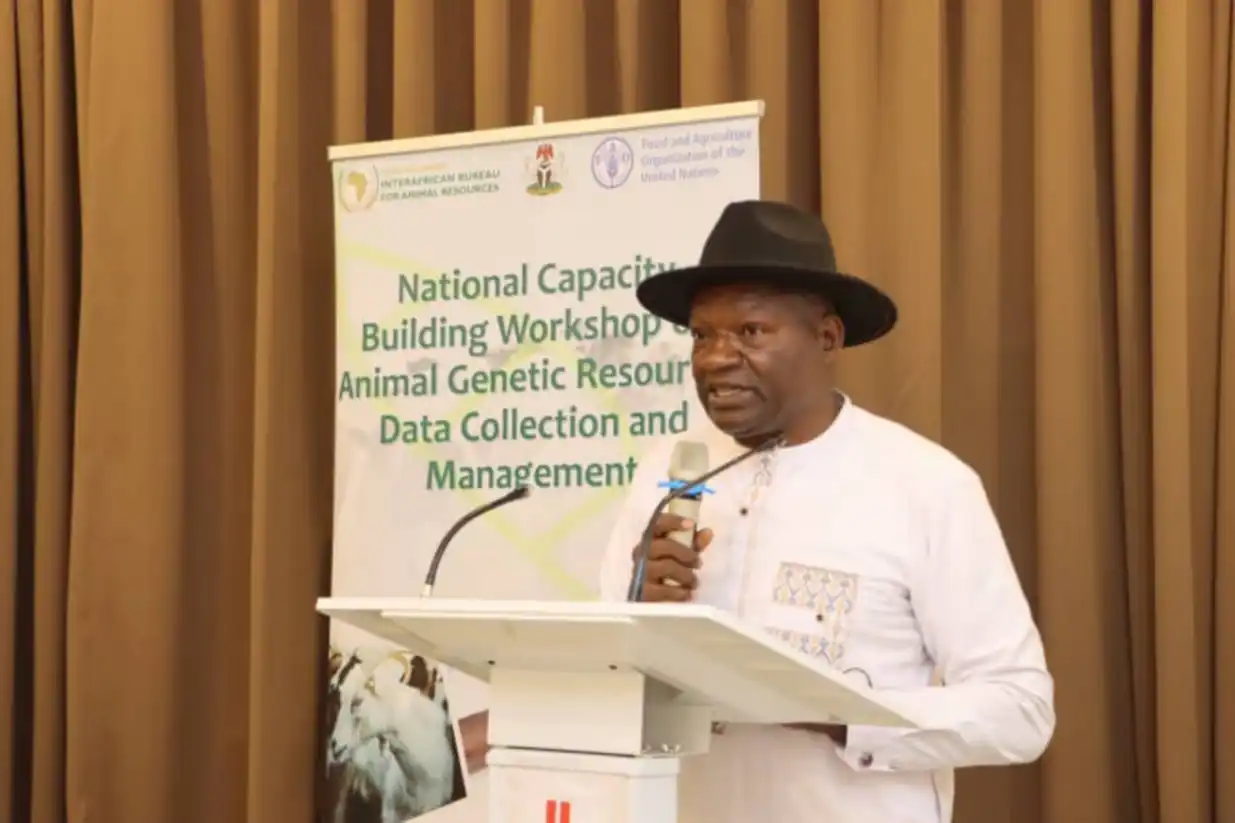The Permanent Secretary of the Federal Ministry of Livestock Development, Dr. (Mrs.) Chinyere Ijeoma Akujobi, has stressed the importance of proper data collection, documentation, and management of Animal Genetic Resources (AnGR) as a foundation for evidence-based policy formulation, research, breeding programmes, and sustainable utilization.
Dr. Akujobi made this known during the National Capacity Building Workshop on Data Collection and Management of Animal Genetic Resources, held in Abuja on Tuesday, October 14, 2025. The event was organized by the African Union Inter-African Bureau for Animal Resources (AU-IBAR) in collaboration with the Federal Ministry of Livestock Development.
Represented by the Director, Technical, in the Office of the Permanent Secretary, Dr. Peter Alike, the Permanent Secretary emphasized that animal genetic resources are central to livestock productivity, resilience, and adaptation to climate change.
“This workshop could not have come at a more opportune time, as the livestock sector continues to play a critical role in national food security, economic development, rural livelihoods, and environmental sustainability,” she said.
According to her, the event reaffirms Nigeria’s commitment to transforming the livestock sector through innovation, science, and technology. She added that the effective management of data on animal genetic resources is key to achieving sustainable livestock production and boosting agricultural GDP.
“Nigeria, like many African countries, is blessed with a rich diversity of indigenous animal genetic resources. However, the lack of robust and harmonized data collection and management systems has hampered our ability to fully harness this potential,” she said.
Dr. Akujobi described the capacity-building workshop as a vital step toward strengthening institutional and human capacity to generate reliable data, adopt modern management tools, and align with continental and global strategies for the sustainable use of AnGR.
The Permanent Secretary reiterated the Ministry’s commitment to modernizing the livestock industry through the National Livestock Growth Acceleration Strategy (NL-GAS), which serves as the Ministry’s flagship framework for transforming the sector into a productive, inclusive, and data-driven industry.
“The NL-GAS provides a clear roadmap for improving animal genetics, enhancing feed and fodder systems, strengthening veterinary services, and promoting data-driven decision-making across the entire value chain,” she explained.
She assured stakeholders of the Ministry’s full support in implementing the outcomes of the workshop and pledged continued collaboration with AU-IBAR, regional bodies, research institutions, and development partners to strengthen livestock development policies and practices across Nigeria.
Dr. Akujobi encouraged participants to take full advantage of the training, share experiences, and build lasting partnerships that would improve data management practices in their institutions and communities. “I urge participants to make the most of this workshop, acquire new skills, exchange experiences, and build lasting partnerships. The knowledge and tools gained here will help improve practices and promote sustainability in livestock development,” she said.
In his opening remarks, the Head of the Northeast Sub-Office for the Food and Agriculture Organisation (FAO) of the United Nations in Nigeria, Al Hassan Cisse, highlighted Nigeria’s position as host to the largest livestock population in Africa, with 58.5 million cattle, 124 million goats, 64 million sheep, 14 million pigs, and 180 million poultry.
He also noted Nigeria’s diverse livestock breeds, including the Red Sokoto goat and the White Fulani cattle, stressing the need to safeguard genetic diversity. “Globally, one in four local animal breeds is at risk of extinction, and West Africa remains a data-deficient hotspot,” he said.
Cisse expressed optimism that the workshop would help develop effective data collection tools, sampling plans, and management protocols that would contribute to Nigeria’s first-ever Animal Genetic Resources dataset, to be integrated into the global Domestic Animal Diversity Information System (DAD-IS).

